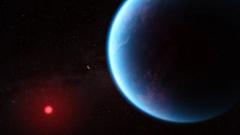As scientists advance their search for life beyond Earth, a turning point may have been reached with the detection of a gas associated with biological processes on the distant exoplanet K2-18b. This breakthrough fuels hopes that we are on the brink of confirming alien life, a prospect echoed by Prof. Nikku Madhusudhan of Cambridge University. The potential implications of such a discovery raise profound questions about our existence and significance in the vast universe.
Historically, the idea of life on other planets has been a staple of human imagination, inspiring both wonder and fear as seen in early depictions of Martians during a time rife with political tensions. However, significant progress has been made since the early 1990s when astronomers confirmed the existence of exoplanets, changing the focus of research to worlds outside our solar system. Now, nearly 6,000 exoplanets have been identified, many situated within the habitable 'Goldilocks Zone' that could potentially support life.
The technological advancements in astronomical instruments have been pivotal in this exploration. The launch of NASA’s James Webb Space Telescope (JWST) marks a major milestone, enabling detailed analyses of exoplanet atmospheres for biosignatures—chemical markers indicative of life. Upcoming missions like the Habitable Worlds Observatory (HWO) and the Extremely Large Telescope (ELT) promise even more ambitious capabilities, allowing researchers to delve deeper into the search for life.
Despite the excitement, the scientific community is cautious. Even if biosignatures are confirmed on K2-18b, debates will arise over whether they could stem from non-biological sources. Continuous observations and studies will be needed to reinforce any claims about extraterrestrial life. Prof. Catherine Heymans emphasizes that as we gather more data from various exoplanets, confidence in the existence of life elsewhere will strengthen, but absolute certainty may remain elusive for a while.
Additionally, the quest for life continues within our solar system. Missions to Mars, the icy moons of Jupiter and Saturn, and beyond are being planned, aiming to uncover evidence of extraterrestrial organisms or their remnants. The ExoMars rover and China's Tianwen-3 mission may unearth vital clues about life’s potential existence in extraterrestrial environments.
The prospect of discovering even the simplest forms of life raises further philosophical questions about humanity's special status in the universe. Experts like Dr. Robert Massey suggest that such a revelation could diminish our perceived uniqueness, echoing through centuries of astronomical discoveries that have steadily displaced us from a central position in cosmic hierarchies.
Ultimately, the discovery of life beyond our planet could reshape not only scientific discourse but also societal structures, encouraging unity and connection among all humans as we come to terms with our shared existence in the cosmos. Prof. Madhusudhan anticipates that realizing we share the universe with other life forms will lead to profound transformations in our worldview, dissolving barriers of language, politics, and geography.
As the search for extraterrestrial life intensifies, many believe it is not a question of "if" but "when" we will make significant, perhaps world-altering discoveries. This journey to find out who—or what—else shares our universe may turn out to be the most significant chapter in human history yet written.
Historically, the idea of life on other planets has been a staple of human imagination, inspiring both wonder and fear as seen in early depictions of Martians during a time rife with political tensions. However, significant progress has been made since the early 1990s when astronomers confirmed the existence of exoplanets, changing the focus of research to worlds outside our solar system. Now, nearly 6,000 exoplanets have been identified, many situated within the habitable 'Goldilocks Zone' that could potentially support life.
The technological advancements in astronomical instruments have been pivotal in this exploration. The launch of NASA’s James Webb Space Telescope (JWST) marks a major milestone, enabling detailed analyses of exoplanet atmospheres for biosignatures—chemical markers indicative of life. Upcoming missions like the Habitable Worlds Observatory (HWO) and the Extremely Large Telescope (ELT) promise even more ambitious capabilities, allowing researchers to delve deeper into the search for life.
Despite the excitement, the scientific community is cautious. Even if biosignatures are confirmed on K2-18b, debates will arise over whether they could stem from non-biological sources. Continuous observations and studies will be needed to reinforce any claims about extraterrestrial life. Prof. Catherine Heymans emphasizes that as we gather more data from various exoplanets, confidence in the existence of life elsewhere will strengthen, but absolute certainty may remain elusive for a while.
Additionally, the quest for life continues within our solar system. Missions to Mars, the icy moons of Jupiter and Saturn, and beyond are being planned, aiming to uncover evidence of extraterrestrial organisms or their remnants. The ExoMars rover and China's Tianwen-3 mission may unearth vital clues about life’s potential existence in extraterrestrial environments.
The prospect of discovering even the simplest forms of life raises further philosophical questions about humanity's special status in the universe. Experts like Dr. Robert Massey suggest that such a revelation could diminish our perceived uniqueness, echoing through centuries of astronomical discoveries that have steadily displaced us from a central position in cosmic hierarchies.
Ultimately, the discovery of life beyond our planet could reshape not only scientific discourse but also societal structures, encouraging unity and connection among all humans as we come to terms with our shared existence in the cosmos. Prof. Madhusudhan anticipates that realizing we share the universe with other life forms will lead to profound transformations in our worldview, dissolving barriers of language, politics, and geography.
As the search for extraterrestrial life intensifies, many believe it is not a question of "if" but "when" we will make significant, perhaps world-altering discoveries. This journey to find out who—or what—else shares our universe may turn out to be the most significant chapter in human history yet written.



















